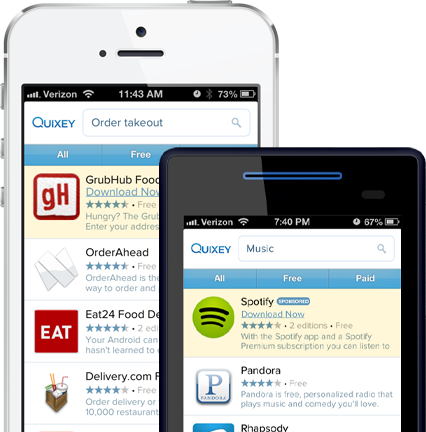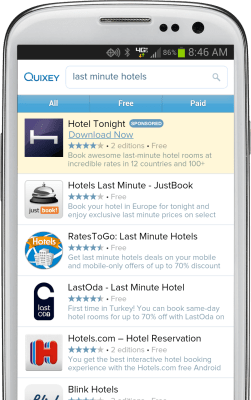Quixey, the semantic app search engine backed by $24.2 million from the likes of Eric Schmidt’s Innovation Endeavors, is taking its first step to making money: from today, it will start to add sponsored results alongside those generated organically through its free search algorithm. Tomer Kagan, Quixey’s co-founder and CEO, tells TechCrunch that sponsored app ads, which launches today in beta, is stage-one in a longer term plan to introduce more advertising tiers and other monetization options through its platform.
“This is our first foray into advertising,” he told TechCrunch. “But we are experiementing with everything.” He says that developers that come in at the beta phase will be the first to have access to those further developments as and when they come along.
Like Appsfire, Chomp before it was bought by Apple, and many others, Quixey offers its own interface for finding apps, primarily for Android devices. But its main business is in powering app search for others, with customers including Microsoft, Sprint, UCWeb, Ask.com, and others that Kagan says the company does not disclose. Overall, Quixey processes some 100 million queries each month.
Up to now, Quixey has been licensing its platform those partners free of charge, and offering its search free as well. Those will both remain in place, with no plans to charge for its APIs, says Kagan.
 The sponsored search, he says, has been built on the same algorithms that power the company’s search services, which are conceived differently from those of traditional search. The latter will use keywords from an app’s title, metadata and description to select apps based on users’ search criteria. Quixey uses this, too, but also factors in other things such as how much an app is mentioned online in reviews and social media. This semantic search is able to parse and incorporate, for example, sentiment about how useful an app has been and where it’s been used, or when it has been slammed by consumers.
The sponsored search, he says, has been built on the same algorithms that power the company’s search services, which are conceived differently from those of traditional search. The latter will use keywords from an app’s title, metadata and description to select apps based on users’ search criteria. Quixey uses this, too, but also factors in other things such as how much an app is mentioned online in reviews and social media. This semantic search is able to parse and incorporate, for example, sentiment about how useful an app has been and where it’s been used, or when it has been slammed by consumers.
Kagan’s reason for opting first for sponsored search results comes right down to some of the most basic success in search advertising taught to us by Google: those doing searches for apps have the highest intent for selecting and downloading apps, so they will be the most likely to convert through those ads as well. Going forward into future formats, whether Quixey’s ability to surface more relevant apps for users in other places — say, in apps themselves — will generate conversions remains to be seen. Overall, the Mobile Marketing Association predicts that by 2015, mobile app downloads will generate $100 billion in revenue: that is the market of which Quixey hopes to take a share.
For now, it is entering a well-trodden field, with companies like Facebook, GetJar, and TapJoy all using the format of app search as a basis for paid promotions for other apps. Facebook actually pulled out of this space earlier this month to encourage users to take other ad formats, while GetJar has tried to diversify into other areas like virtual currency for other revenue streams.
Today’s news also marks another change for Quixey: the company has traditionally interfaced most directly with app store operators — be they internet portals, carriers, phone makers or others — but moves like sponsored app ads brings the startup closer to appealing directly to developers. Kagan says that this has been spearheaded primarily by Richard Gregory, Quixey’s EVP of revenue, who joined from Spotify and before that spent years at Google. “Just as we are making it easier for users to find the right apps, it’s important for us to connect developers to the right users for their apps,” Kagan said. This points to more products, and more in-app activity to promote more transactions, in the future.
The company’s last round, $20 million about one year ago, included a couple of international investors in the form of SK Planet and Translink Capital. That was made with international moves in mind; for now Quixey’s business is mainly focused on the U.S. market and others where English is used.
